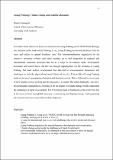Files in this item
Luang Prabang : climate change and rapid development
Item metadata
| dc.contributor.author | Fumagalli, Matteo | |
| dc.date.accessioned | 2021-06-17T23:37:09Z | |
| dc.date.available | 2021-06-17T23:37:09Z | |
| dc.date.issued | 2020-02 | |
| dc.identifier | 263520408 | |
| dc.identifier | 71fb9a60-7b81-47c4-a912-1065c85458d3 | |
| dc.identifier | 85076467942 | |
| dc.identifier | 000510082600037 | |
| dc.identifier.citation | Fumagalli , M 2020 , ' Luang Prabang : climate change and rapid development ' , Cities , vol. 97 , 102549 . https://doi.org/10.1016/j.cities.2019.102549 | en |
| dc.identifier.issn | 0264-2751 | |
| dc.identifier.other | ORCID: /0000-0002-1451-2088/work/66398382 | |
| dc.identifier.uri | https://hdl.handle.net/10023/23382 | |
| dc.description.abstract | Few other Asian cities have been as orientalised as Luang Prabang, the former capital of the Royal Kingdom of Laos and a UNESCO World Heritage site. Situated on the banks of the Mekong River, Luang Prabang has historically been a hub for trade and culture in upland Southeast Asia. The internationalisation engendered by the country's economic reforms and rapid opening up to and integration in regional and transnational economic processes has led to a surge in investment, trade, development assistance and tourist flows. All this has brought opportunities for the residents of Luang Prabang, but such sudden development has also led to socioeconomic dislocation and challenges to both the physical and social fabric of the city. This profile of Luang Prabang looks at the town's geographical location and physical context. This is followed by an account of how spatial use has evolved and the pressures it is under, particularly following the spike in tourist arrivals that followed the city's inscription as a World Heritage site. The article highlights the city's environmental vulnerabilities, zooming in on the impact of climate change which compounds the challenges of rapid development. Far from being fixed in timelessness, the town truly lies at the nexus of local and global processes, experiencing and shaping change, and negotiating the tensions between conservation and development. | |
| dc.format.extent | 11 | |
| dc.format.extent | 1673870 | |
| dc.language.iso | eng | |
| dc.relation.ispartof | Cities | en |
| dc.subject | Laos | en |
| dc.subject | Luang Prabang | en |
| dc.subject | Southeast Asia | en |
| dc.subject | Climate change | en |
| dc.subject | Development | en |
| dc.subject | FDI | en |
| dc.subject | Trade | en |
| dc.subject | Aid | en |
| dc.subject | Environmental hazards | en |
| dc.subject | Internationalization | en |
| dc.subject | Heritage | en |
| dc.subject | Conservation | en |
| dc.subject | Economic reforms | en |
| dc.subject | New economic mechanism | en |
| dc.subject | UNESCO | en |
| dc.subject | World heritage | en |
| dc.subject | GE Environmental Sciences | en |
| dc.subject | HV Social pathology. Social and public welfare | en |
| dc.subject | JZ International relations | en |
| dc.subject | DAS | en |
| dc.subject | BDC | en |
| dc.subject | R2C | en |
| dc.subject | SDG 11 - Sustainable Cities and Communities | en |
| dc.subject | SDG 13 - Climate Action | en |
| dc.subject.lcc | GE | en |
| dc.subject.lcc | HV | en |
| dc.subject.lcc | JZ | en |
| dc.title | Luang Prabang : climate change and rapid development | en |
| dc.type | Journal article | en |
| dc.contributor.institution | University of St Andrews. School of International Relations | en |
| dc.identifier.doi | 10.1016/j.cities.2019.102549 | |
| dc.description.status | Peer reviewed | en |
| dc.date.embargoedUntil | 2021-06-18 |
This item appears in the following Collection(s)
Items in the St Andrews Research Repository are protected by copyright, with all rights reserved, unless otherwise indicated.

